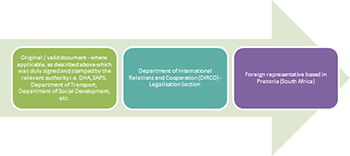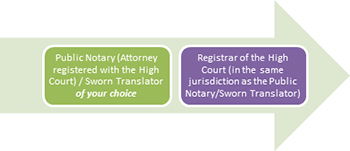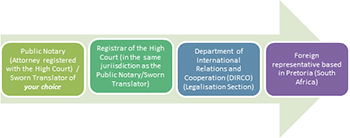DIRCO Apostille Service 1 -2 weeks
Quick Complete DIRCO Apostille Service. We will submit, pick up and courier anywhere worldwide. Lead times has decreased to 1 - 2 weeks.
Since the implementation of strict Covid protocols, it has become incrementally more difficult and time-consuming to legalise your documentation in person at DIRCO. No walk-in customers are allowed, and an appointment must be scheduled, which may take considerable time and cause significant frustration. Make use of a professional document legalisation company that will get your documents correctly apostilled and legalised in the shortest possible time in these restrictive times. The typical cost is R850 per document.
Get Quotation - Get Started
Most customers order and quote online. Submit the online form, and we will get right back to you. If you are unsure how to complete the order form or need any advice on additional service, do not hesitate to message us for professional, free advice. Tel: 0870010733.
Get a Quotation
Notary Costs
What is a Notary Public?
WhatsApp - Talk to Us
QUICK QUOTE DIRCO APOSTILLE
Complete the online form to get a quotation with estimated lead times. Get your questions answered. Document legalision and notary public services are dependent on the circumstances at hand and in which destination country your document will presented. Exact pricing is not available until you communicate the factual situation to us. In order to find out what you need and for us quote you , please complete the online form to get the exact costs and time estimate.
About DIRCO Consular Notarial Services
About DIRCO Consular Notarial Services
The Legalisation Section of DIRCO, the Department of International Relations and Cooperation, is responsible for apostilling South African documents. Apostilles are extra certificates attached to original documents and serve as an authenticator that the stamp and seal on a South African document are verified and accurate. South Africans travelling abroad are often required to legalise their documents for official use abroad. And therefore, documents are apostilled. However, there are some strict requirements that documents must comply with to be accepted by DIRCO.
Legalising official documents and end-user certificates
The Legalisation Section at the Department of International Relations and Cooperation can issue the relevant Apostille Certificate or Certificate of Authentication subject to the following rules:
- The documents are still valid.
- You must advise the Legalisation Section in which country the document will be used to allow the section to determine if an Apostille or Authentication Certificate is required.
- Depending on the type of documentation, you may first have to get the documentation stamped/signed by the appropriate department or institution; by a magistrate, an additional magistrate or assistant magistrate; or a registrar or an assistant registrar of the High Court of South Africa before the Legalisation Section can issue the relevant Apostille or Authentication Certificate.
The following documents are not accepted by DIRCO:
- Abridged documents or computer printouts.
- Certified copies of marriage, birth, death or police clearance certificates.
- Certified copies of certificates of marital status (no impediment) or proof of citizenship.
- Certified copies of travel documents or identity documents.
- Documents legalised by commissioners of oath to be true copies of the original must be taken to a public notary (an attorney who is registered at the High Court).
- Laminated documents.
DIRCO APostille F.A.Q
How long does it take to get DIRCO Apostille ?
Can my DIRCO Apostille be expedited.?
Do DIRCO accept walk -in members from the public?
Which Documents can be presented direct to DIRCO for Apostille or Authentication ?
- Birth Certificate
- Marriage Certificate
- Death Certificate
- Letter of No Impediment
- Police Clearance Certificate
- Drivers License Confirmation
- SANDF Exemption Letter
What is a Notary Copy?
Which Documents must first be Authenticated before presenting them to DIRCO?
- All Qualifications.
- Medical Certificates.
- School Transfer Documents.
What is the difference between apostille and notarisation?
An apostille to a document is the authentication, that the document was authenticated as having been issued and signed by a specially appointed government official. The apostille is internationally accepted under a convention of The Hague. In South Africa, the Apostille is issued by The Department of International Relations and Co-operation or as Generally known DIRCO
An Embassy Attested document has the same value as an Apostille document with the difference that the Apostille Certificate is substituted by an Authentication Certificate at DIRCO with a final Attestation by the relevant Embassy.
Can Laminated or Certified documents be used.?
I have heard that getting my South African documents Apostilled at DIRCO could be lengthy. Is there any way of avoiding it
What is an Apostille?
What is The Hague Convention?
On what documents do I get an Authentication or Apostille?
All tertiary education documents must be notarised or verified by the central Student Administration area of the issuing institution. Please note that some universities will not confirm their documents with an original signature, in which case a Notary Public must notarise the document.
Where can I get more information regarding the DIRCO Apostille Service?n South Africa?
Flow diagram: To follow the process as explained above (when the destination country is signatory to the Apostille Convention) – and when the Apostille Certificate will be issued and affixed:

Flow diagram: To follow the process as explained above (when the destination country is NOT signatory to the Apostille Convention) – and when the Certificate of Authentication will be issued and affixed:

Flow diagram: Process when following the route of the i.e. Public Notary/Registrar of the High Court (when the destination country is signatory to the Apostille Convention) – and when the Apostille Certificate will be issued and affixed

Flow diagram: Process when following the route of the i.e. Public Notary/Registrar of the High Court (when the destination country is NOT signatory to the Apostille Convention) – and when the Certificate of Authentication will be issued and affixed:
 Important notes (pertaining to documents that follow the route of the Public Notary (or Sworn Translator) and the Registrar of the High Court):
Important notes (pertaining to documents that follow the route of the Public Notary (or Sworn Translator) and the Registrar of the High Court):- The signature of a Notary Public, Justice of the Peace or any court employee who is not a Registrar has to be legalised by a Magistrate, Additional Magistrate or Assistant Magistrate or by a Registrar or Assistant Registrar of any division of the High Court of South Africa within the jurisdiction of which such Justice of the Peace exercises his or her function or such Notary Public is in practice, before documents are submitted to the Legalisation Section for legalisation purposes.
- Documents must be bound together with the signature of the Registrar / Magistrate as the final signature of the first page, verifying the signature of the Public Notary or Justice of the Peace. The documents must be bound with a ribbon and red seal and the dry seal / stamp clearly visible on the document.
- A Registrar can only verify the signatures of a) an Attorney who is registered at the High Court as a Public Notary practising in the same jurisdiction of the relevant court or b) a Sworn Translator who is registered at the High Court in the same jurisdiction of the relevant court.
- The country of destination should be clearly specified to ensure the correct procedure is followed by the High Court.
- Copies of official documents signed by a member of the South African Police Services (SAPS) are not accepted.
Do DIRCO accept walk-In customers?
Where to find DIRCO / Contact Information
Department of International Relations and Cooperation (DIRCO)
Attention: Legalisation Section
OR Tambo Building
460 Soutpansberg Road
Rietondale
PRETORIA, 0084
Postal Address (We do not advise using this option)
Department of International Relations and Cooperation (DIRCO)
Attention: Legalisation Section
Private Bag X152
PRETORIA, 0001
E-mail: legalisation@dirco.gov.za (all legalisation enquiries)
What law are applicable to document legalisation?
- The Hague Convention of 5 October 1961 (Abolishing the Requirement of Legalisation for Foreign Public Documents). Source: The Hague Conference on Private International Law – http://www.hcch.net.
- Rule 63 of The Rules of the High Court of South Africa, as amended by G.N. R.500 dated 12/3/82 and R.801 dated 23/4/82.
- Rules of the High Court of South Africa as published in Government Notice R.277 dated 3rd March, 1967.


